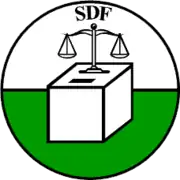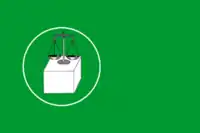Social Democratic Front Front Social Démocrate | |
|---|---|
 | |
| President | Joshua Osih |
| Founder | Ni John Fru Ndi |
| Founded | 26 May 1990 |
| Headquarters | Bamenda, Cameroon (de jure) Yaoundé, Cameroon (de facto) |
| Youth wing | Social Democratic Front Youth |
| Ideology | Social democracy[1] Federalism Anglophone Minority Interests |
| Political position | Centre-left |
| International affiliation | Socialist International Progressive Alliance |
| Colors | Green |
| Slogan | Demócratie, Justice, Dévéloppement ("Democracy, Justice, Development") |
| Senate | 1 / 100 |
| National Assembly | 5 / 180 |
| Party flag | |
 | |
| Website | |
| www | |
The Social Democratic Front (French: Front Social Démocrate) is the main opposition party of Cameroon. It was led by Ni John Fru Ndi from its foundation until his death in 2023, and receives significant support from the Anglophone Southwest and Northwest Regions.
History
The SDF was launched in Bamenda on May 26, 1990 in opposition to the ruling Cameroon People's Democratic Movement; following the launching rally, six people were killed by security forces. The party held its Constitutive Assembly on February 3, 1991 and elected its National Executive Committee.[2] The party refused to sign the Tripartite Declaration of November 1991, and it chose to boycott the March 1992 parliamentary election, along with the Democratic Union of Cameroon, due to the government's failure to meet opposition demands, which included the establishment of an independent electoral commission to oversee the election.[3] However, the party announced at its May 1992 national convention that it would take part in the presidential election later that year.[4] Fru Ndi, the SDF candidate in the October 1992 presidential election, received about 36% of the vote against about 40% for incumbent President Paul Biya, according to official results.[5] The SDF believes he was denied victory "at gunpoint". He has now been largely criticized in the national press for moving residence to Yaoundé.
The SDF won 43 seats in the National Assembly in the May 1997 parliamentary election,[2][6][7] receiving its best results in Northwest Province, where it won 19 out of 20 seats; it also won a majority of seats in West Province, with 15 out of 25.[7] It chose to boycott the October 1997 presidential election, along with the National Union for Democracy and Progress (UNDP) and the Cameroon Democratic Union (UDC).[6] In the June 2002 parliamentary election, the SDF won 22 seats;[8][9][10][11] it won one of these seats in a revote held for some constituencies on 15 September.[10] Although the party lost nearly half its seats in the 2002 election, it still dominated in Northwest Province, where it again won 19 out of 20 seats.[11]
In the presidential election held on 11 October 2004, Fru Ndi stood again as the SDF candidate and won 17.4% of the vote according to official results, far behind Biya.[12] In the July 2007 parliamentary election, the SDF won 14 out of the 163 initially declared seats,[9] and it won a further two seats (out of 17 at stake) in constituencies where the election was held over again in September, thus winning a total of 16 out of 180 seats.[13] These additional seats were crucial, because the SDF could not form a parliamentary group unless it had at least 15 seats.[14] The party's electoral success remained largely confined to the Northwest Province, where it again won a majority of seats, with 11 out of 20.[15]
The SDF strongly opposed a constitutional amendment allowing Biya to run for president again in 2011. Its deputies boycotted the April 2008 parliamentary vote in which the amendment was approved, and it subsequently called for a "day of mourning" in which people were to wear black and stay home.[16]
One key alliance is between the SDF and the female Takembeng mobilizations. These women provide protection for SDF officials and a key presence at SDF demonstrations.[17]
International affiliation
The party is a full member of the Socialist International[18] and Progressive Alliance.[19]
Electoral history
Presidential Elections
| Election | Party candidate | Votes | % | Result |
|---|---|---|---|---|
| 1992 | John Fru Ndi | 1,066,602 | 36.0% | Lost |
| 1997 | Boycotted | |||
| 2004 | John Fru Ndi | 654,066 | 17.40% | Lost |
| 2011 | 518,175 | 10.71% | Lost | |
| 2018 | Joshua Osih | 118,706 | 3.36% | Lost |
National Assembly elections
| Election | Party leader | Votes | % | Seats | +/– | Position | Outcome |
|---|---|---|---|---|---|---|---|
| 1992 | John Fru Ndi | Boycotted | 0 / 180 |
Extra-parliamentary | |||
| 1997 | 685,689 | 23.5% | 43 / 180 |
Opposition | |||
| 2002 | 22 / 180 |
Opposition | |||||
| 2007 | 425,435 | 13.6% | 16 / 180 |
Opposition | |||
| 2013 | 508,901 | 12.6% | 18 / 180 |
Opposition | |||
| 2020 | 5 / 180 |
Opposition | |||||
References
- ↑ Krieger, Milton (2008). Cameroon's social democratic front : its history & prospects as an opposition political party (1990-2011). Mankon, Bamenda: Langaa Research & Pub. CIG. ISBN 978-9956558162.
- 1 2 "Significant Events in the Life of the Social Democratic Front" Archived 2007-07-19 at the Wayback Machine, SDF website.
- ↑ Victor Julius Ngoh, "Biya and the Transition to Democracy", The Leadership Challenge in Africa: Cameroon Under Paul Biya (2004), ed. John Mukum Mbaku and Joseph Takougang, page 440.
- ↑ Charles Manga Fombad and Jonie Banyong Fonyam, "The Social Democratic Front, the Opposition, and the Political Transition in Cameroon", The Leadership Challenge in Africa: Cameroon Under Paul Biya, page 469.
- ↑ John Mukum Mbaku, "Decolonization, Reunification and Federation in Cameroon", in The Leadership Challenge in Africa: Cameroon Under Paul Biya (2004), ed. John Mukum Mbaku and Joseph Takougang, page 34.
- 1 2 "Cameroon: IRIN-WA Special Briefing on Presidential Elections", October 11, 1997.
- 1 2 1997 election results Archived 2010-02-14 at the Wayback Machine.
- ↑ IPU PARLINE page for the 2002 election.
- 1 2 "Cameroun: l'écrasante victoire du parti de Biya aux législatives confirmée", AFP (Jeuneafrique.com), August 10, 2007 (in French).
- 1 2 "Législatives partielles: le parti au pouvoir remporte 16 des 17 sièges", AFP (Cameroon-info.net), September 27, 2002 (in French).
- 1 2 2002 election results Archived 2005-08-02 at the Wayback Machine.
- ↑ Sylvestre Tetchiada, "Cameroon: Another seven years for the "absentee captain"" Archived 2006-10-17 at the Wayback Machine, Inter Press Service (afrika.no), October 27, 2004.
- ↑ "Les résulats des législatives partielles proclamés par la Cour suprême", Xinhua (Jeuneafrique.com), October 15, 2007 (in French).
- ↑ "Cameroon: Leading opposition party banks on by-elections to form parliamentary group", African Press Agency, September 17, 2007.
- ↑ "Legislatives 2007: Les résultats de la Cour suprême" Archived 2012-07-28 at archive.today, Mutations (Cameroon-info.net), August 13, 2007 (in French).
- ↑ "Protests against Cameroon's Biya", BBC News, April 21, 2008.
- ↑ DeLancey, Mark Dike; Mbuh, Rebecca Neh (2010). Historical Dictionary of Cameroon. Scarecrow Press. p. 357. ISBN 978-0-8108-5824-4. Retrieved 11 January 2013.
- ↑ List of Socialist International parties.
- ↑ "Participants | Progressive Alliance". Archived from the original on 2015-03-02. Retrieved 2017-11-12.
External links
- Official website
 (in English)
(in English)